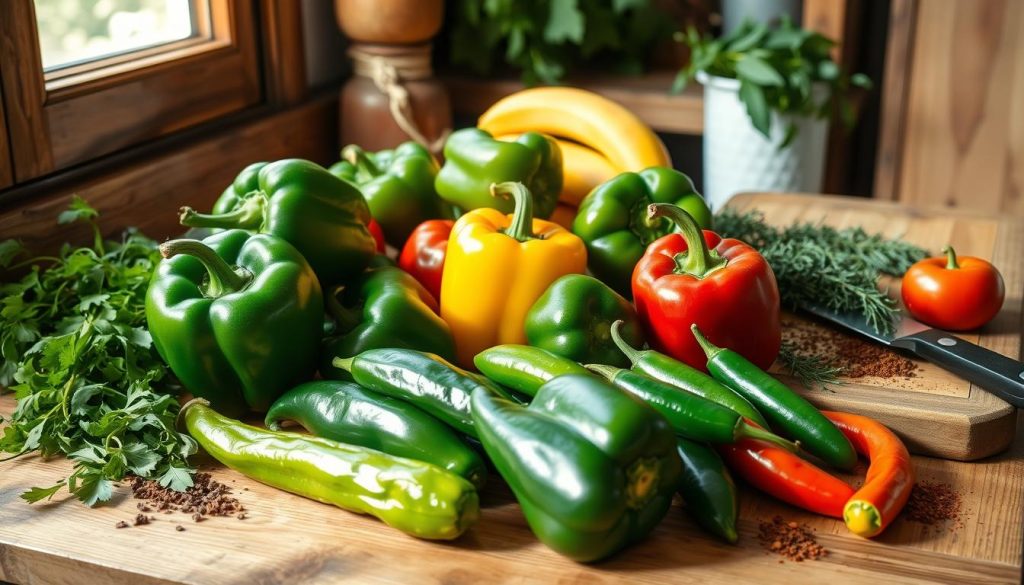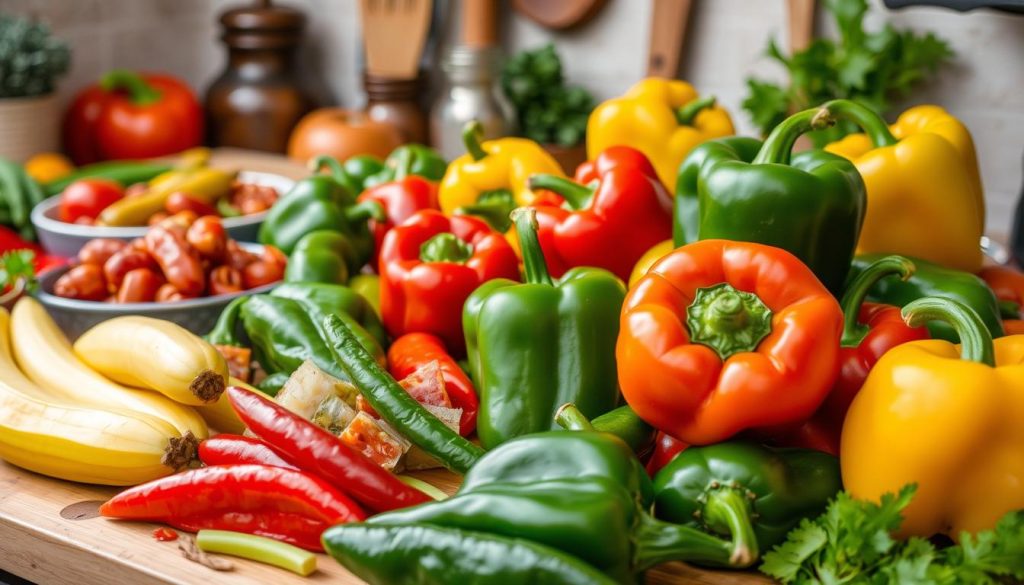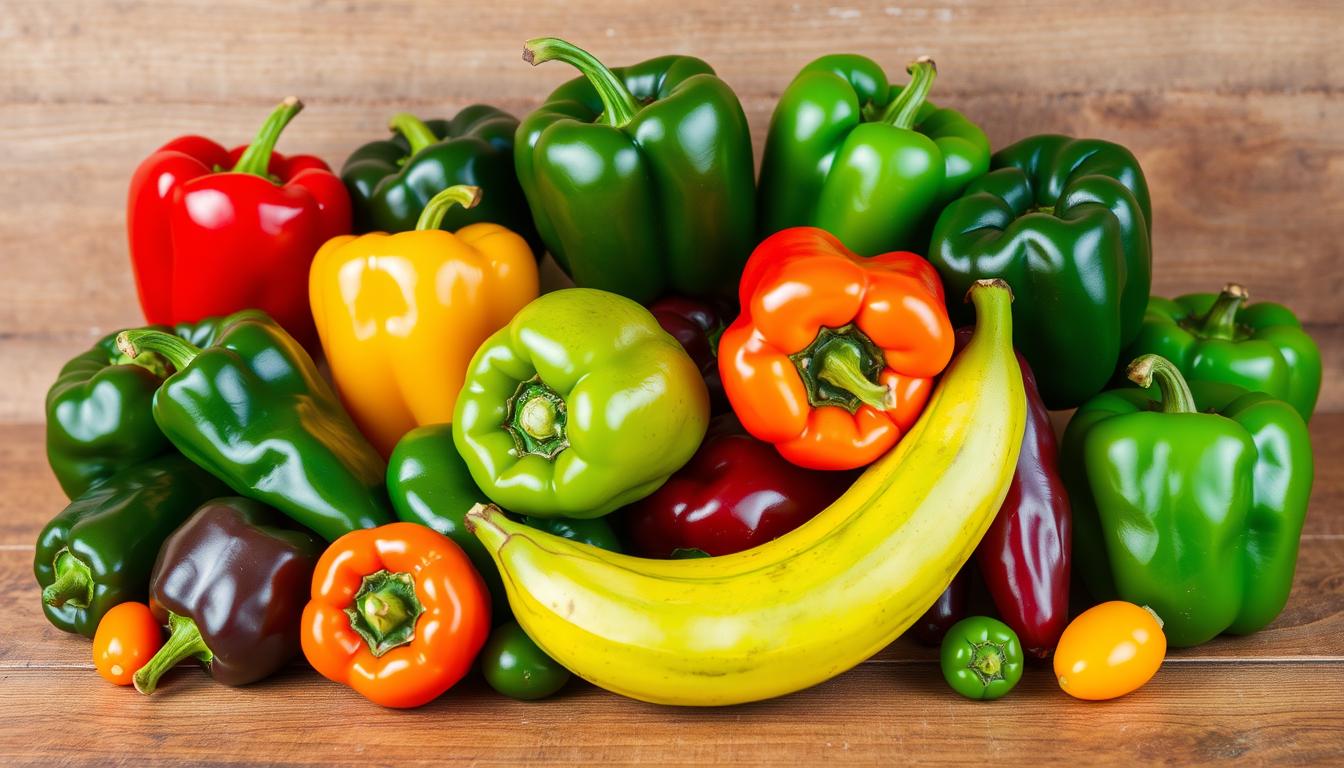Looking for the best cubanelle pepper substitutes? You’re in the right spot. This quick guide will help you find great alternatives when cubanelles are hard to find. Cubanelle peppers are known for their mild heat and sweet taste. They can make many dishes better, but finding them can be tough.
This article will give you a detailed look at the best substitutes for cubanelle peppers. These alternatives will help keep your favorite recipes tasting great.
Understanding Cubanelle Peppers
Cubanelle peppers, also known as Italian frying peppers, have a long shape and thin walls. They are green and vibrant, loved in many cuisines, especially in Central America. They are known for their great taste and versatility in cooking.
What are Cubanelle Peppers?
Cubanelle peppers are quite mild, with a Scoville Heat Unit rating of 0-1,000. This makes them less spicy than jalapeños, which have about 5,000 SHU. They are sweet and mild, making them easy to enjoy by many.
There are different types, like Standard Cubanelle, Sweet Cubanelle, and Bananarama.
Flavor Profile of Cubanelle Peppers
Cubanelle peppers are sweet and have a gentle heat. They are crunchy and full of nutrients like vitamin C and antioxidants. They are low in calories, with only 20 calories in 100 grams.
Common Uses in Cooking
Cubanelle peppers are great for many dishes. They are perfect for stuffing because of their size. Here are some ways to use them:
- Stuffed Peppers
- Salsas and Dips
- Grilling
- Stir-Fries
- Salads
- Soups and Stews
- Fajitas
They are versatile, allowing you to try new recipes and cooking methods. This makes your meals more flavorful.
| Nutrient | Amount per 100g |
|---|---|
| Calories | 20 kcal |
| Protein | 0.9 g |
| Carbohydrates | 4.6 g |
| Dietary Fiber | 1.4 g |
| Sugars | 2.4 g |
| Fat | 0.2 g |
| Vitamin A | 1320 IU |
| Vitamin C | 132 mg |
| Folate | 27 µg |
| Potassium | 187 mg |
Cubanelle peppers are a great choice for your kitchen. They are easy to use in many recipes, offering a delicious and nutritious addition to your meals.
Why Substitute Cubanelle Peppers?
Cubanelle peppers are loved for their mild taste and how well they work in many dishes. Sometimes, you might need to find other options. Knowing why substitute cubanelle peppers opens up new cooking possibilities and helps you make tasty dishes.
Availability Issues
One big reason to look for substitutes is cubanelle pepper availability. These peppers might be hard to find outside certain areas. This can stop you from making a recipe you want. Knowing good alternatives helps keep your dish’s flavor and makes sure you have what you need.
Variety in Recipes
Looking for substitutes also lets you try different flavors and heat levels in your cooking. For example, cubanelle peppers are mild and sweet. But, peppers like Anaheim or Poblano add a bit of spice, making your meal more interesting. Using different peppers can make your dishes more exciting and let you try new things in the kitchen.
| Pepper Type | Spice Level | Scoville Heat Units |
|---|---|---|
| Cubanelle Pepper | Mild | 100-1,000 |
| Anaheim Pepper | Mild-Medium | 500-1,500 |
| Poblano Pepper | Mild-Medium | 1,000-2,000 |
| Bell Pepper | Mild | 0 |
| Jalapeno Pepper | Medium | 2,500-8,000 |
Best Cubanelle Pepper Substitutes
Looking for the right pepper substitute can make your cooking better, especially when cubanelle peppers are hard to find. Many peppers can replace cubanelle, offering different tastes and heat levels. Here are some top picks for cubanelle pepper substitutes.
Anaheim Peppers
Anaheim peppers have a mild heat, ranging from 500 to 2,500 SHU. They add a sweet hint to dishes. This makes them a great choice for many recipes.
Bell Peppers
Bell peppers are sweet and mild, with almost no heat. They’re perfect for salads, salsas, or cooked meals. They’re a favorite for those looking for a mild pepper option.
Banana Peppers
Banana peppers have a tangy taste and a mild to medium heat. They’re a tasty choice for sandwiches or pickling. Their unique flavor makes them a great substitute for cubanelle peppers.
Poblano Peppers
Poblano peppers have a Scoville Heat Unit range of 1,000 to 1,500. They’re not very spicy but have a rich flavor. They’re a good choice for stuffed dishes and sauces.
Hungarian Wax Peppers
Hungarian wax peppers are spicy, with a range of 5,000 to 15,000 SHU. They’re hotter than cubanelle peppers but can still work in some recipes.
Pimento Peppers
Pimento peppers are sweet and mildly spicy. They taste a lot like cubanelle peppers. They’re great in salads or as a stuffing ingredient.
| Substitute | SHU Range | Main Use |
|---|---|---|
| Anaheim Peppers | 500 – 2,500 | Dishes, Salsas |
| Bell Peppers | 0 | Salads, Cooking |
| Banana Peppers | 0 – 500 | Pickling, Sandwiches |
| Poblano Peppers | 1,000 – 1,500 | Stuffed Dishes |
| Hungarian Wax Peppers | 5,000 – 15,000 | Spicy Dishes |
| Pimento Peppers | 100 – 500 | Stuffed, Salads |
Cubanelle Substitute Guide
Choosing the right pepper substitute is key. Different peppers have unique flavors and heat levels. This guide helps you pick the best one by looking at flavor and heat, and adjusting cooking methods.
How to Choose the Right Substitute
Choosing the right pepper depends on your dish and flavor needs. Peppers like Poblano and Anaheim have a sweet, mild taste like Cubanelle. Think if the substitute will improve your dish or if you need to make changes.
Flavor and Heat Consideration
It’s important to know the flavor and heat of your pepper. Ancho and Mulato peppers have an earthy, smoky taste but are mild. Jalapeños are spicier, with a Scoville rating of 2,500 units. Choose a pepper that fits your dish’s flavor balance.
Cooking Method Adaptations
Changing cooking methods is essential for a great dish. When substituting peppers, think about how cooking affects flavor and heat. Roasting Anaheim peppers can make them sweeter. Make sure stuffed peppers keep their shape during cooking. Adjusting cooking times and methods can create a perfect flavor mix.

Comparative Heat Levels
Knowing the heat levels of different peppers is key when swapping out cubanelle peppers in recipes. The Scoville Heat Units (SHU) measure how spicy peppers are. Cubanelle peppers have a heat range of 100 to 1,000 SHU, making them a good starting point for comparison.
Understanding Scoville Heat Units (SHU)
Scoville Heat Units help us understand the spiciness of peppers. They show how much capsaicin a pepper has, which makes it spicy. Knowing the SHU of cubanelle peppers helps you find substitutes that match your spice level.
Heat Comparison of Personal Preferences
When looking at pepper heat, it’s important to see how substitutes compare to cubanelle peppers:
| Pepper Type | Scoville Heat Units (SHU) | Heat Profile Compared to Cubanelle |
|---|---|---|
| Cubanelle | 100 – 1,000 | Baseline for comparison |
| Banana Pepper | 0 – 500 | Approximately 2 times milder |
| Bell Pepper | 0 | Significantly milder |
| Poblano Pepper | 1,000 – 1,500 | Around 2 times hotter |
| Anaheim Pepper | 500 – 2,500 | Approximately 3 times hotter |
| Hungarian Wax Pepper | 5,000 – 10,000 | Roughly 14 times hotter |
| Pimento Pepper | 100 – 500 | About 2 times milder |
Knowing the heat levels of your favorite peppers helps you adjust recipes. This ensures your dishes are just right for you. Whether you prefer milder or spicier flavors, understanding the Scoville scale helps you make the perfect choice.
Creative Uses for Cubanelle Substitutes
Exploring new ways to use pepper substitutes can make cooking more fun. These alternatives can add excitement to many dishes, especially stuffed ones. Each pepper has its own taste, opening up a world of flavors.
In Stuffed Dishes
Pepper substitutes can really make stuffed dishes stand out. For example, poblano peppers are great for stuffing with cheese or rice. They have a mild spiciness and smoky taste. Fresno peppers, with their fruity and spicy flavor, are also excellent choices.
Try mixing different peppers to find the perfect flavor for you.
As Toppings and Garnishes
Peppers can add color and taste to your meals. Bell peppers, in their various colors, are perfect for salads and tacos. They have a mild, sweet taste.
You can also use banana peppers to add a bit of spice to sandwiches or burgers. Their mild flavor won’t overpower your dish.
In Salsas and Dips
Peppers can make salsas and dips more interesting. Fresno peppers are great for salsas because of their sweet and warm taste. Poblano peppers can add a smoky flavor to dips.
Using different peppers lets you create unique flavors and experiences in your cooking.

Tips for Cooking with Cubanelle Substitutes
Using substitutes for Cubanelle peppers can make your dishes better. Knowing how to prepare these substitutes is key. It helps the flavors work well together.
Preparation Techniques
Getting your substitute pepper ready right can really boost its taste. Here are some important steps:
- Deseeding: Taking out seeds from peppers like Anaheim or Poblano can make them less spicy. This makes them better for many dishes.
- Chopping: Cutting peppers into the same size pieces helps them cook evenly. This ensures the flavors spread out well in your recipes.
- Roasting or Grilling: Using these methods can make your substitute pepper sweeter. This adds richer flavors to your dish.
Cooking Times and Temperature Adjustments
When you use a substitute pepper, you need to adjust cooking times and temperatures. For instance:
| Substitute Pepper | Recommended Cooking Time | Temperature Adjustments (if any) |
|---|---|---|
| Anaheim Peppers | 10-15 minutes | Increase by 25°F for roasting |
| Banana Peppers | 5-10 minutes | No adjustment needed |
| Poblano Peppers | 15-20 minutes | Reduce by 25°F for shrinkage |
| Bell Peppers | 10-15 minutes | No adjustment needed |
Conclusion
In this guide, you’ve learned about many substitutes for cubanelle peppers. Peppers like Anaheim, bell, and poblano offer different heat levels and tastes. This knowledge helps you adjust recipes, keeping your dishes flavorful even without cubanelle peppers.
These peppers are great in stuffed dishes, salsas, and as garnishes. Each adds a special touch to your meals. As you try new recipes, remember to be flexible. Choose substitutes that fit your taste and enjoy exploring new flavors.
Pepper production is growing, with over 540,000 metric tons in 2020 from countries like Vietnam and Brazil. This means you’ll find more substitutes to try. Whether you’re making a spicy salsa or a stuffed pepper, these options will make your cooking better and your meals more enjoyable.
Source Links
- https://pepperscale.com/cubanelle-pepper-substitute/
- https://pepperscale.com/cubanelle-pepper/
- https://www.alsothecrumbsplease.com/anaheim-pepper-substitute/
- https://www.chilipeppermadness.com/chili-pepper-types/sweet-mild-chili-peppers/cubanelle-chili-peppers/
- https://www.faskitchen.com/cubanelle-peppers-101/
- https://thewoksoflife.com/pork-pepper-stir-fry/
- https://peasandhoppiness.com/blog/pepper-picking-guide/
- https://www.cozymeal.com/magazine/jalapeno-substitute
- https://www.wideopencountry.com/did-you-know-types-of-peppers/
- https://www.holisticwow.com/peppers/differences/cubanelle-vs-poblano/
- https://www.chefspencil.com/poblano-pepper-substitutes/
- https://discover.texasrealfood.com/swap-and-savor/pimientos-substitutes
- https://www.saveur.com/gallery/Chile-Pepper-Gallery/
- https://www.spiceandlife.com/cubanelle-pepper/
- https://www.holisticwow.com/peppers/cubanelle-pepper/substitutes/
- https://www.purveyd.com/blogs/purveyd-blog/list-of-pepper-by-heat-levels-scoville-heat-units?srsltid=AfmBOoptuMDLJTMGv9EVrOxSO3c85EI1fgexSI3tayJP-D6f-Qgtx-hW
- https://asksphere.blog/cubanelle-pepper-substitutes/
- https://www.holisticwow.com/peppers/cubanelle-pepper/
- https://www.tastythais.com/mild-chili-peppers-suitable-substitutions/
- https://pmc.ncbi.nlm.nih.gov/articles/PMC10000673/
- https://www.grandmaducky.recipes/2021/08/how-to-peel-bell-peppers-the-complete-guide/
